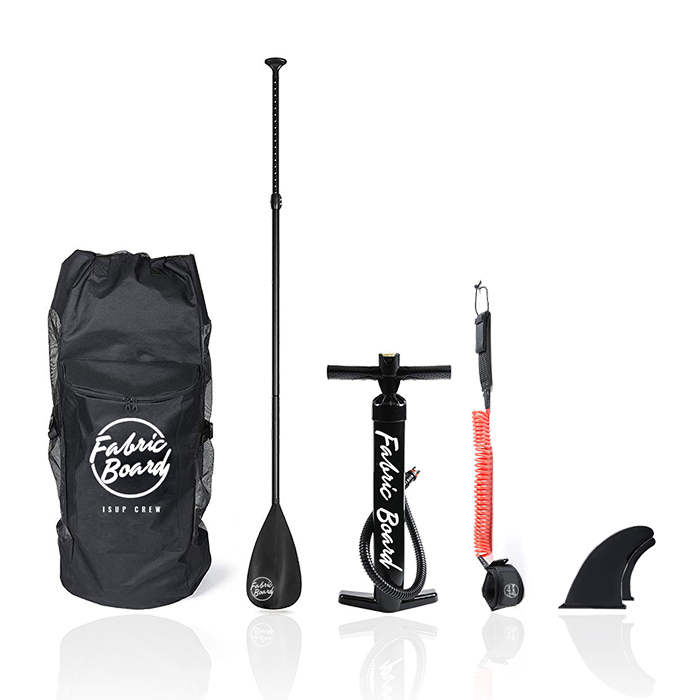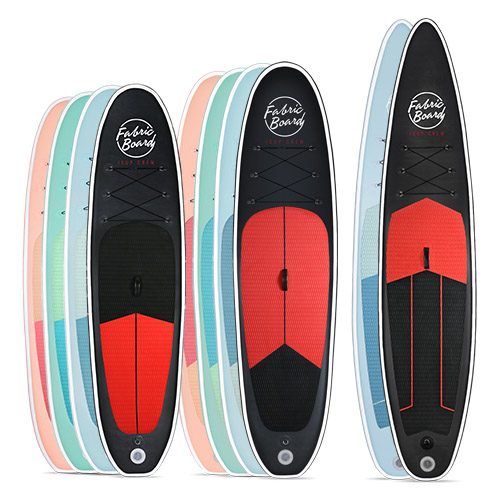We are pretty sure you will enjoy our paddleboards without problems. However, in case you encounter any queries regarding our warranty or return policy, you are on the correct link.
WARRANTY
Warranty
We offer a two year warranty on manufacturer defects. This warranty doesn’t cover obvious abuse, such as running over your board or dragging it across shards of glass (c’mon). If you suspect something with your purchase isn’t quite right or if you are missing an accessory, please let us know right away. If you see any damage or malfunction, email us at support@fabricboardco.com.
Our limited warranty will only cover manufacturer defects. This means that this limited warranty excludes boards and gear that show damage caused by abuse, heat, and sun exposure as well as incorrect or unreasonable use and poor handling.
Although 6 months after delivery, the consumer must prove that the faults correspond to a manufacturing defect.
More detailed information can be found in our Terms of Sale.
Information on guarantees in the sale of consumer goods
Assets regulated by law
The Law of Guarantees is applied to personal property for private consumption, that is to say consumer goods: from a household appliance to a vehicle, passing through furniture, objects of all kinds, including works of art. By their own concept services and real estate are eliminated.
The Law excludes purchase-sales between individuals.
For new consumer goods the guarantee will be two years, while for second-hand products, the guarantee will be one year. During the first six months of guarantee of a new product it is assumed that the damage comes from the factory and the seller must assume all the costs of the repair, both parts, transfer, and hours of work. The warranty period is suspended for as long as the product or object is under repair.
The law considers that a consumer should feel satisfied with the product purchased if it meets the following requirements: that the product meets the description given by the seller and that it has the qualities manifested through a demonstration or model. It must also serve for what is indicated in the instruction book, as well as in the verbal indications that the salesperson may have made or in a demonstration video. Also it serves as usual the publicity, the indications that appear reflected in a label, or a use that detaches of the own characteristics of the product. Even if the consumer has requested a special use and the seller has assured him that the purchased good will offer it, it must be. In addition, the product that is purchased must have the quality and the appropriate behavior. Thus, a pressure cooker must cook faster than a traditional kettle.
Law Enforcement
The Law obliges sellers of consumer goods, on the one hand, and consumers as final recipients, on the other. That is, contracts that are made between individuals are excluded, since it only foresees the purchase and sale between a professional seller and a consumer.
It will apply whenever a consumer good is purchased, that is, any object or product for private consumption. Property acquired in a judicial sale (auction of confiscated property) is excluded. The distribution of bottled water or gas for sale is also not subject to this law.
Claim in case of product failure
The first person responsible for the product is the seller. However, the consumer can go directly to the manufacturer or the importer, if going to the seller is a burden. For example, if during a vacation away from home you have acquired a digital camera that does not respond to what is offered in the store, it is easier for the consumer to go to the manufacturer or importer than to the establishment where he bought it. /> In case the product does not respond to the announced characteristics, the consumer can choose between the repair of the good or its replacement, unless this is impossible or disproportionate. If the repair or replacement is not possible, or is disproportionate, the consumer may opt for an appropriate reduction in the price or the termination of the contract, that is, the return of the price.
The consumer can not demand replacement when it is second-hand goods or goods of impossible substitution. For example, substitution can not be demanded if the good is no longer manufactured or there are no stocks, if a second-hand vehicle is acquired or, due to the impossibility that it entails, a work of art, an antiquity or a design can be replaced. exclusive clothes The substitution will be disproportionate when it is a small defect of easy or simple repair. The repair will be disproportionate when it is uneconomical, that is, the repair is more expensive than the value of the property.
Claim periods
The consumer must go to report the ruling within two months of detecting it. In this sense, if the problem has appeared in the six months after the purchase of the product, the seller must make the guarantee effective, since in that period of time it is assumed that the problem comes from the factory. However, if those six months have passed, it is the consumer who must demonstrate that the failure comes from origin and that it has not been caused by misuse of the product.
The Law establishes that during the six months after the repaired goods are delivered, the seller will respond for the faults that caused the repair, presuming that it is of the same fault when reproducing defects of the same origin as those initially repaired. To be able to make this guarantee of the repair effective, the consumer must keep the proof of the repair and the technical service that, in his day, repaired the product.
Failure after repair or replacement
The Law gathers these possibilities: If the consumer chose the replacement of a product with a fault, for the same one, he can ask the seller for the repair, provided it is not disproportionate , the reduction in the price or the return of the money. On the other hand, if before a failure in a product the repair was chosen, the consumer can demand a change, a reduction in the price or the return of all the money disbursed.
But the Law does not specify neither the amount nor the type of price reduction that the seller must make to the consumer if that option is chosen. Thus the two parties involved in the purchase and sale are required to reach agreements that satisfy both.
Refusal to repair, lower the price or return the money
If we are within the first six months, we must demand reparation and request a Claims Sheet and insist even until we reach a trial. It is presumed that the fault existed. But if the first six months have already passed, we are the other way around. It is the consumer who must prove that the product was purchased with the lack.
In any case the consumer will have to negotiate and if you do not agree with the rebate offered by the seller you can go to an appraiser to determine the price of the product after the repair and request a price reduction in that sense.
Instruction book and bad installation
If a consumer misuses a product, because the instruction book is incorrect, the warranty law protects the consumer and may require repair or replacement . Similarly, if the failure is caused by a bad installation caused both by the incorrect instructions in the manual, and by the technicians sent by the seller, this is also responsible.
In case of repair or transfer to a technical service, what should the consumer pay?
Nothing. During the period in which the guarantee is effective, the seller or producer must take charge of the cost of the trips, the parts and the time of repair. Also, while the product remains in the technical service, the guarantee time is suspended. That is, the clock does not run. On the other hand, apart from demanding the application of the guarantee (repair, change, price reduction or refund of money), the consumer can demand compensation for the damages or damages arising from the breakdown and repair time, example, if a user purchases a fridge and it breaks down after a week of purchase, in addition to requesting that the guarantee be made effective, the user can demand compensation for food that has been damaged due to the malfunction of the appliance.
Commercial warranty
The commercial guarantee is one that the manufacturer, distributor or seller give and that must always exceed that offered by law, as this is understood as a minimum required by the consumer. It is also a marketing tool for companies. However, this guarantee must meet certain requirements, such as making it clear to what it applies, the object or product that has said guarantee and the name and address of the person offering it.





